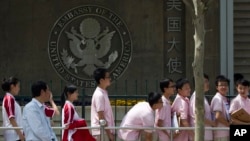Student Union
OK Boomer and Peter Pan, It's Wealth Not Age
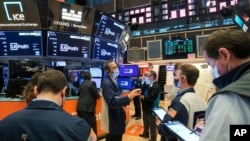
On one side of the TikTok split screen was a middle-aged man, ranting that “millennials and Generation Z have the Peter Pan syndrome.”
“They don’t ever want to grow up,” he said, referring to the fictional character who fights adulthood.
On the other side of the split screen, a teenager contemplated the rant before silently holding up a notepad, and the phrase “OK Boomer” was born.
Since 2019, the hashtag #okboomer has been used 3.7 billion times on TikTok and has sparked debate between Boomers — born 1946 to 1964 — and Zoomers — born in the 1990s to the 2010s, and who use the video conferencing app Zoom liberally — about whether age and generation are to blame for society’s ills.
Some observers think the debate is fundamentally illogical. “Generations are pretty bogus. The labels we use to casually slice up society — boomer, millennial, Gen X, Gen Z — are a nearly useless way of thinking about politics, culture or business in America,” wrote journalist Farhad Manjoo in The New York Times in 2019.
“The very idea that tens of millions of people across different classes and races and geographies might hold similar views on a range of subjects just because they happened to be born during the same 20-year span of American history — the whole thing sounds a bit too much like astrology, doesn’t it?” he asked.
Niraj Dawar, professor emeritus of marketing at the Ivey Business School at the University of Western Ontario in Canada, agrees, calling generational labels “obsolete.” Labels are helpful if the generation shares characteristics, behaviors or events — like a world war, he said.
Even then, generational labels cannot always be used to predict how people within the same age range will behave, or buy, or vote, he said.
“You have two groups of millennials, one that plays golf and the other doesn't,” he messaged to VOA Student Union. “It's very likely that their golf playing is a better predictor of their other consumption than being a millennial.”
“And, in fact, being a golfer may mean their consumption is more similar to other golfers [say boomer golfers] than non-golf playing millennials,” he texted.
Generations used to be counted as every 20 to 30 years because people generally followed the same life milestones: getting married near age 20, having children soon after, buying a house at 30, having grandchildren at 50, and retiring around age 65.
This enabled economists and academics to organize societies in a way that most people could relate. But in the 1970s, those milestones started to change, with marriage and childbearing happening later in the U.S. Throw globalization into the mix and grouping people for demographic, academic or marketing purposes became less useful.
And some, like lawmakers Bernie Sanders, Elizabeth Warren and Alexandra Ocasia-Cortez, see increasing wealth disparity rather than pages on a calendar as the root of conflict between younger and older.
In the 1980s, U.S. tax laws under President Ronald Reagan made it easier for people with money to keep it and shifted collective public burdens, like higher education and infrastructure, to individuals through fees and tolls.
And gaps in income and wealth between richer and poorer households continue to widen, states the Pew Research Center in Washington.
Upper-income families were the only ones able to expand their wealth from 2001 to 2016, adding 33% at the median, Pew reported in January 2020. At the same time, middle-income families saw their median net worth shrink by 20%. Lower-income families experienced a loss of 45%.
“Increasingly, life after age 65 in the U.S. is a ‘two worlds of aging’ experience, with the well-off older adults doing better and the less well-off part of the income distribution doing worse,” said Stephen Crystal, professor in the Institute for Health, Health Care Policy and Aging Research and the School of Social Work at Rutgers University in New Jersey.
“Based on the economic experience… of people who are now in their middle years and will make up the future elderly, we can expect this problem to become worse, not better,” he said.
Senator Warren, a Baby Boomer, and Senator Sanders, who is actually older than the Boomers, say the inequities have to be addressed to enable all Americans to live with fewer financial burdens.
On March 1, Warren proposed the Ultra-Millionaire Tax Act to reduce wealth inequality. The act would impose a 3% annual tax on the net worth of households and trusts exceeding $1 billion, and 2% annual wealth tax on households and trusts ranging from $50 million to $1 billion. Representative Pramila Jayapal (D-Seattle) and Representative Brendan Boyle (D-Pennsylvania) were co-sponsors.
Representative Alexandria Ocasio-Cortez (D-New York) has also strongly supported the idea of a wealth tax. In 2019, she called for raising the tax rate to 70% on incomes over $10 million.
Ralph Sonenshine, assistant professor of economics at American University in Washington, says the global reach of today’s tech companies has a greater impact on the economy than age.
“Bill Gates and Steve Jobs were a generation before Mark Zuckerberg,” Sonenshine noted. “Microsoft for example went public in 1987 versus 2012 for Facebook. The growth of e-commerce and overall globalization enabled some companies and individuals to build fantastic amounts of wealth.”
So while the proposed wealth tax would fall on Boomers in their 70s and 80s, it would also impact people like Chad Richison, 49, who founded Paycom; Jeff Bezos, Amazon founder, 57; Tesla founder Elon Musk, 49; Larry Page and Sergey Brin of Google, 47; and Facebook CEO Mark Zuckerberg, 37, all on lists of the world’s wealthiest people.
Higher taxes on wealth and income have opponents too, like Donald Boudreaux, chairman of the economics department at George Mason University in Virginia. He says tax cuts in the 1980s spurred wealth through hard work.
“I am actually a fan of Reagan’s tax cuts because one consequence of the tax cuts is that it allows productive people to keep more of what they produce,” said Boudreaux. “And so by encouraging people to work harder and longer, and by encouraging people to invest more, that increases wealth for everybody.”
Still, some see the country’s economic problems through a generational prism.
“I’m not a fan of baby boomers,” wrote Sean Illing in an online conversation with fellow millennial Helen Andrews, a senior editor at The American Conservative, who penned “Boomers: The Men and Women Who Promised Freedom and Delivered Disaster.”
Andrews argued that millennials are imitating Boomers.
“At a certain point you have to stop blaming your parents and also stop blaming yourself, and just say, where do we go from here?” Andrews suggested. And her answer?
“If there’s hope, it lies with Gen X,” she said, referring to the age group sandwiched between Boomers and millennials, born 1965 to 1980. “So even though Gen X is aging now, we still have not yet seen all that they can do.”
See all News Updates of the Day
- By Dylan Ebs
International students find community during Pride Month
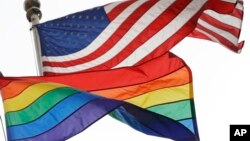
For LGBTQ+ international students, Pride Month, observed in June, is a unique time to reflect.
They hold on to multiple identities — both their LGBTQ+ identity and their cultural background — but coming to terms with them is not always easy.
For graduate student David Zhou, these identities can feel conflicting as transgender rights in China remain a controversial issue and spaces for LGBTQ people close. Zhou, 25, is transgender and pursuing an education in the STEM field at an urban university in the Midwestern United States.
VOA is using a pseudonym for Zhou’s first name and is not naming his university to protect his identity due to safety concerns back home in China. Zhou is not open about his transgender identity to his family.
During Pride Month, Zhou said he attended multiple LGBTQ+ events in his community and is surrounded by a supportive group of LGBTQ+ students who can relate to his experiences. But he’s not open about his identity to everyone on campus and said he doesn’t disclose his preferred pronouns to everyone to avoid transphobic comments.
“I feel like I have to make some judgments of the character of that person to see if they’re a good person to disclose [my identity] to,” Zhou said.
Zhou’s Pride Month celebrations included attending local markets with LGBTQ+ vendors and hanging out with his LGBTQ+ friends.
“They normalized being trans and for a long time I feel like trans identity is, should I say a vulnerability, brings me fear and worrying about discrimination, but having those events are helpful because it allowed me to see that queer people could just [live] openly,” he said.
At social events where few international students are present, Zhou said it can be tough to fit in.
“There's a lot of times like when they were talking about things I kind of, don't really understand, mostly because I kind of lack some background experience or knowledge,” he said.
Zhou said he is not aware of specific groups for LGBTQ+ international students at his university, but said international students are more prevalent in graduate programs and therefore find representation in organizations for LGBTQ+ graduate students.
In China, transgender individuals must obtain consent from an “immediate family member,” even for adults hoping to transition, which critics say limits the autonomy of transgender individuals while supporters say the policy protects doctors from violence by upset parents.
Struby Struble, a former coordinator of the University of Missouri LGBTQ+ Resource Center, told NAFSA: Association of International Educators in 2015 that LGBTQ+ international students face a “double barrier” on campus.
“With their international student friends, they feel isolated because they’re the LGBT one,” she said. “But then among the LGBT students on campus, they feel isolated because they’re the international one.”
Nick Martin, associate director of the Q Center, Binghamton University’s LGBTQ+ student support office, said when international students tour the center, there’s often a sense of hesitation as they enter a type of space that may not be present in their home country.
“I compare that to a year in after they've come into the space, they've again, maybe come to some of our events, they've got more connected,” he said.
Martin said graduate students have a unique interest in the Q Center as they may use the office for research and advocacy purposes that align with their studies.
“For older students, there may be hesitancy in a different way, but I think it's more in the vein of they want to do some of the advocacy work,” he said.
Martin said he thinks about how both his office and BU’s international student office can support students who come from countries with few — if any — protections for LGBTQ+ individuals.
“It's been a learning process of what those students really need, but I think I've kind of learned that a lot of students are just looking for the safe space that we offer,” Martin said.
- By VOA News
International students discuss US campus culture shock

International students at De Anza College in Cupertino, California, talked about culture shock in an article in La Voz News, the student newspaper.
"It felt like a major culture shock. Everything was so different, from academics to mannerism," said a student from Mexico.
Read the full story here.
These are the most expensive schools in the US
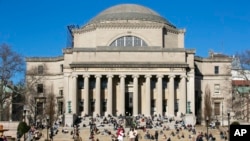
High tuition costs along with housing and food expenses can add up for students at U.S. colleges and universities.
MSNBC looked at the most expensive schools in the country, with one costing more than $500,000 for a bachelor’s degree. (June 2024)
Uzbekistan students admitted into top US universities
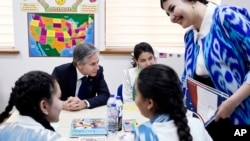
Students from Uzbekistan are among the international students admitted to top colleges and universities in recent years.
Gazata.uz profiled some of the Uzbekistan students attending Harvard, Brown, Princeton and other U.S. universities. (June 2024)
- By Stella Hsu
Reports of visa checks, deportations worry Chinese STEM students in US
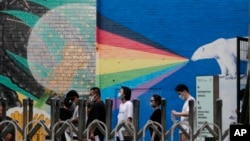
Geopolitical tensions and growing competition in tech between the United States and China appear to be spilling over into academia despite commitments from the world’s two biggest economies to boost people-to-people exchanges.
The United States remains the top choice for Chinese students seeking to study abroad with nearly 300,000 studying in American colleges and universities during the 2022-2023 school year. But reports of some cases that students and professors are facing extra scrutiny while passing through immigration and the deportation of others are raising concerns.
For Chen Xiaojin, a doctoral student studying semiconductor materials at a university in the Washington, D.C., metropolitan area, it has been six years since she returned to her hometown of Beijing.
At first, it was the COVID-19 pandemic that kept her from going home. But over the past two years, she has been deterred by accounts of Chinese students majoring in science and engineering being required to reapply for their visas upon returning to China.
She also says she is worried by reports over the past six months of Chinese students being deported, even at nearby Dulles Airport.
"My current research is relatively sensitive, and my boss [adviser] is getting funds from the U.S. Department of Defense, making it even more sensitive,” she told VOA. "I am afraid that I won't be able to return after I go back [to China]."
Chen says that if she did return to China, she would have to apply for a new visa.
In a report late last month, Bloomberg said it had found at least 20 Chinese students and scholars with valid visas who were deported at U.S. Customs since November and barred from reentry. The U.S. Customs and Border Protection Agency does not release relevant data.
Immigration attorney Dan Berger represented one Chinese student who was deported late last year. He tells VOA Mandarin that the student studied biological sciences at Yale University and was about to complete her doctorate.
She visited her family in China and got a new visa but was deported by customs at Dulles Airport and barred from reentering the country for five years. Berger said he did not see anything suspicious in the transcript of the conversation between the student and the customs officer.
"We have seen what seems like a pattern over the last six months of Chinese PhD students being turned around…. more than I've seen in quite a while," he said.
Matthew Brazil, a fellow at the Jamestown Foundation, said neither country seems willing to explain the situation. However, he believes that in most cases, the United States must have valid reasons for blocking visa holders from entering the country.
In some cases, the student’s background may not match what is written on the visa application. In other cases, customs agents may also find something that the State Department missed, and once they see it, they are responsible for taking action.
"I wish the Chinese side would be specific about their students who were refused entry,” he said. “The fact that both sides are mum on details and that the Chinese side is engaged with the usual angry rhetoric means that each has security concerns. And that says to me that there was good reason for the U.S. to stop these particular applicants."
Brazil also sees a connection between the entry denials and export control regulations issued by the United States in October 2022 that restrict China's ability to obtain advanced computing chips, develop and maintain supercomputers, and manufacture advanced semiconductors.
U.S. Customs and Border Protection is one of the law enforcement agencies authorized to investigate violations of export control regulations, he said.
"Beijing's intelligence agencies are known to focus attention on PRC [People's Republic of China] students and scientists headed abroad who study or work on dual-use technologies controlled under the Export Administration Act — compelling Chinese students and scientists to report on what they've learned when they return to China on holiday,” he said. “This has been true for decades."
Bill Drexel, a fellow for the Technology and National Security Program at the Center for a New American Security, said the U.S. government did find some cases where students tried to steal strategic technology for China.
"I think it would both not be surprising that they found some really questionable or incriminating evidence for some students,” he said. “It would also not be surprising if, in their hunt for really solid evidence, they also may have made some mistakes on other students.”
Drexel adds that “it’s just kind of an unfortunate fact of the time that we live in and the tactics that the CCP uses when it comes to these measures."
In a post on X in early May, U.S. ambassador to China Nicholas Burns tried to dispel concerns about visas and entry to the United States for students and scholars. In the post, he said "99.9% of Chinese students holding visas encounter no issues upon entering the United States.”
In an interview with The Wall Street Journal Monday, Burns said it is China that is making it impossible to promote people-to-people ties. Burns told the Journal that students attending events sponsored by the United States in China have been interrogated and intimidated.
He also said that since U.S. President Joe Biden and China’s leader Xi Jinping held their summit in San Francisco last year, China’s Ministry of State Security and other agencies had interfered with Chinese citizens’ participation at some 61 events.
At a regular briefing on Wednesday, Chinese Foreign Ministry spokesperson Mao Ning dismissed those accusations, saying that they did not “reflect reality" and that went against key understandings reached by both countries’ presidents in San Francisco.
“The United States, under the pretext of 'national security,' unjustifiably harasses, interrogates, and deports Chinese students in the U.S., causing them significant harm and creating a severe chilling effect,” Mao said. “The image of the United States in the minds of the Chinese people fundamentally depends on the actions of the United States itself.”
Drexel said he believes Burns’ comments about visas and students' willingness to study in the U.S. still ring true.
“On balance, it's still the case that American universities are overwhelmingly warm towards Chinese students and want them in large numbers," he said.
However, Berger, the immigration lawyer, is concerned about the chilling effect recent cases involving Chinese students could have.
"In general, we are being more careful about advising Chinese graduate students in STEM fields about traveling and letting them know that there is some small risk,” he said.
Even though the risk is small, it does seem to be real at the moment, he said.
Adrianna Zhang contributed to this report.








